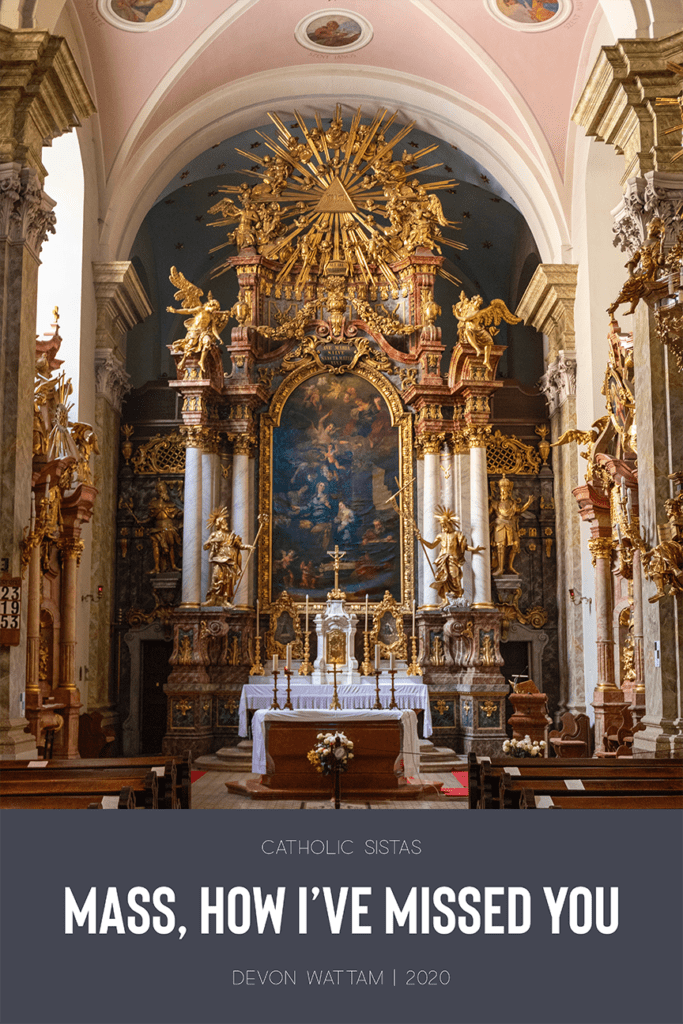
I went to Mass for the first time in three months recently. Masks were on, every other pew was strategically roped off, parishioners obediently sat six feet apart. Meanwhile, hymnal boxes sat empty, holy water had been replaced with hand sanitizer, and not one paper bulletin could be found.
I prayed quietly for a few minutes before I noticed the elderly lady two rows in front of me looking around to make sure no one saw her lower her mask to gasp for fresh air. Key West is not the place you want to be sitting with something covering your face for an hour in sweltering heat and humidity. I felt her pain.
Even with the church being only a quarter of the way full, it was eerily silent. No hushed salutations from one family to the next or chatter from fidgety children as one might expect on a typical Sunday morning. In fact, there were no small children present at all, including my own.
After several prolonged moments of silently observing the sterile basilica, bells began to toll. It was time to begin. The organist welcomed in the masked lectors and altar servers, followed by the priest from the side of the sanctuary. She belted out approximately one verse of the opening hymn before my vision blurred with hot tears. It had been too long.
There’s a lot to be learned from a global pandemic that leaves the whole world cooped up for months on end. Along with so many things, one revelation became abundantly clear: Mass is underappreciated.
The Church is a People, Not a Building.
When the quarantine began, my friends on social media bemoaned not being able to worship together. I shared in their heartache. Coming together as a community to praise, give thanks, and petition the Lord at the start of each week is vital for believers. It’s as necessary as taking a shower in the morning or doing the dishes in the evening.
Not being able to do these things in a particularly tense period only makes the uncertainty of current events all the scarier.
Like all things that people take for granted, I didn’t realize how good it was to be able to go to church until I no longer could.
It didn’t take long for me to realize that I had been lulled into a drunken state of complacency over the past thirty years. One in which being able to bear witness to my faith every Sunday in the safety of my parish walls had left me spoiled and lazy.
If there was one silver lining to be found in being forced to spend Sundays at home, though, it was getting the opportunity to pause and consider the heart of what we as Christians truly believe. We don’t congregate for social purposes. We don’t do it for entertainment or investment opportunities or personal gain. We do it to maintain a relationship with God. And you don’t need a building to do that.
By taking the only way I knew how to worship away, the pandemic left me with no choice but to be more intentional with how I was going to keep Sunday holy, or abandon it altogether. The decision was clear, but not easy.
How would I worship Christ without a priest holding my hand every step of the way? What would motivate me to sing loudly, pray earnestly, or dress for the Lord when my neighbors weren’t there to bear witness to it?
Social distancing had presented a big, shiny mirror up to my heart and the reflection staring back at me wasn’t always pretty.
We are Physical Beings. Our Worship Should Be, Too.
The quarantine had proven that I didn’t need a building to worship God, but it sure does help.
Gathering my family together to pray the rosary, watch Mass online, or read the Bible was fruitful in so many ways. Striving to deliberately keep Sundays sacred is beautiful, but it made me miss the concrete reminders of my faith that I can only find in a church all the more.
It brought to mind the time a friend who’d fallen away from the Church questioned why Catholic churches insist on being so ornate.
“Are the elaborate stain-glassed windows, gold chalices, and expensive statues really necessary? Wouldn’t God be happier with people worshipping in a simple building and using the extra money to help someone instead?” His question was sincere, but misguided.
What he didn’t realize was that all of those “extra” things help far more people on a weekly basis than the money used to buy them would’ve been able to had they been spent on food or clothing for the needy. Those beautiful, elaborate decorations not only bring glory to God, but they help remind countless people of him constantly when they are in his presence. Each statue, window, symbol, and image draw people’s short attention spans back to the reason they came to church in the first place: Jesus.
Are these elements essential to encounter the Risen Lord? No. Are they beneficial? Absolutely.
Mass engages all five of the senses; that’s not a coincidence. Humans are physical beings as much as we are spiritual. It’s as necessary as ever that we worship as such.
Celebrating Christ in the living room had been nice, but I needed more. I want to smell the incense, taste the bread and wine, see the beautiful images that lift my mind to heaven. I need to feel my neighbor’s hand at the sign of peace, hear the uplifting music, and kneel in adoration before the Eucharist. None of these things are accidental. It’s the way God intended worship to be: spiritual and physical.
These are experiences that we simply cannot have alone in our living rooms day in and day out. They can only be found in Mass.
If that’s not essential, what is?
